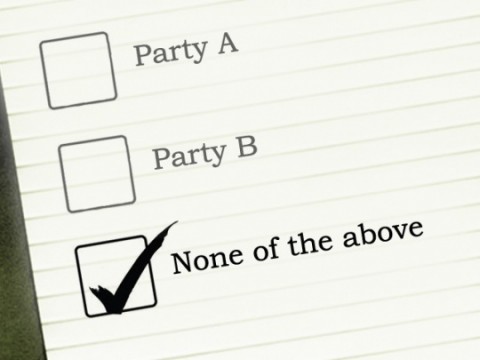
The choice given by Indian supreme court to voters to reject any or all candidates in an election by opting for “None of the above” (NOTA) in voting machines and on ballot papers won’t make any difference and won’t affect election results.
New Delhi, Oct 29/Nationalturk – In what could not go well with Indian voters and people favouring negative voting, Indian Election Commission has said the choice given by Indian Supreme Court to voters to reject any or all candidates in an election by opting for “None of the above” (NOTA) in voting machines and on ballot papers won’t affect election results.
Indian Supreme Court in a historic judgement on September 27 this year gave Indian voters the right to reject all the candidates in the fray with the option of NOTA in voting machines and on ballot papers.
“In a vibrant democracy, the voter must be given an opportunity to choose none of the above (NOTA) button, which will indeed compel the political parties to nominate a sound candidate. This situation palpably tells us the dire need of negative voting,” read a judgement given by bench of Chief Justice P Sathasivam, Justice Ranjana Prakash Desai and Justice Ranjan Gogoi.
India joined club of 13 having provisions of negative voting
After the judgement, India joined the club of 13 nations including France, Belgium, Brazil, Greece, Bangladesh, Finland, Sweden, the US, Colombia and Spain that have the provision to reject candidates.
However, Election Commission of India has clarified that reject votes won’t make any difference and won’t affect election results.
“The Supreme Court observed that the provisions of Rule 49-O under which an elector not wishing to vote for any candidate had to inform the Presiding Officer about his decision, are ultra vires Article 19 of the Constitution and Section 128 of the Representation of the People Act, 1951,” reads a statement issued by Election Commission of India (ECI).
Candidate polling maximum valid votes will be declared winner
It said as per the provisions of clause (a) of Rule 64 of Conduct of Elections Rules, 1961, read with Section 65 of the Representation of the People Act, 1951, the candidate who has polled the largest number of valid votes is to be declared elected by the Returning Officer.
“Therefore, even if the number of electors opting for NOTA option is more than the number of votes polled by any of the candidates, the candidate who secures the largest number of votes has to be declared elected,” ECI statement said.
It further said if the number of contesting candidates is equal to the number of seats to be filled, the Returning Officer has to declare all the contesting candidates to be duly elected. “In the case of elections to Indian parliament and State Assemblies, in cases where there is only one contesting candidate in the fray, the Returning Officer has to, in accordance with the provisions declare the sole contesting candidates as elected. The provision of NOTA option which is an expression of decision not to vote for the contesting candidates is not relevant in such cases,” added ECI.
‘Court gave voters right to register negative opinion’
Former chief election commissioner of India S Y Quraishi had said Supreme Court has just given “the right to register a negative opinion to the voters.”
“The new provision does not mean that all candidates in a constituency stand rejected or defeated if the number of NOTA votes exceeds the number garnered by the highest vote-getter. Even if there are 99 NOTA votes out of a total of 100, and candidate X gets just one vote, X is the winner, having obtained the only valid vote. The rest will be treated as invalid or ‘no votes’, he had written in an article published in Indian newspaper.
Quraishi was India’s chief election commissioner from June 2010 to July 2012.
Write your comments and thoughts below
Faiz Ahmad / NationalTurk India News


